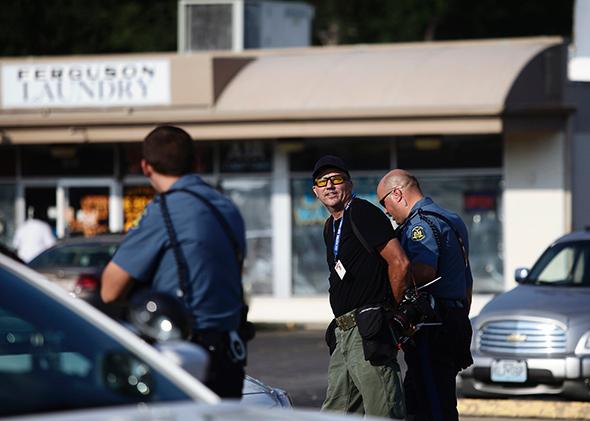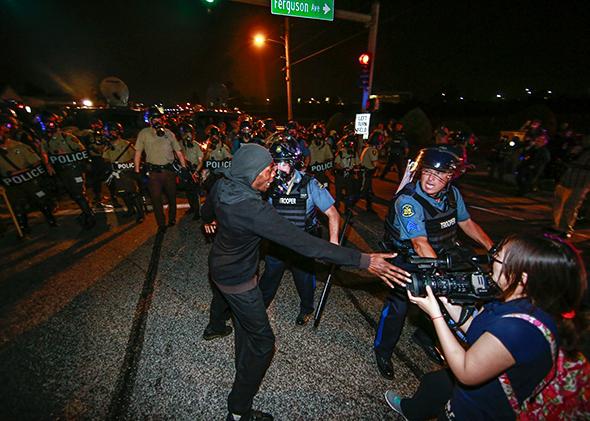Anyone tuning in to the nightly coverage of the protests in Ferguson has seen the reporters on the ground becoming part of the story. On Monday night, they could watch (and follow along on Twitter) as CNN’s Don Lemon was shoved by police and as his colleague Jake Tapper fled tear gas. The night before MSNBC’s Chris Hayes was threatened with mace and, in one of the more troubling moments caught on film since the demonstrations began, Mustafa Hussein, a journalist who has been live-streaming the unrest for Argus Radio, was warned by an officer to turn off his camera light lest he be “shelled.”
Those reporters’ experiences aren’t unique and in fact are less threatening than what some of their colleagues have encountered (never mind the people of Ferguson, who have faced the greatest dangers by far). At last count, at least 11 journalists have been arrested or detained in Ferguson while covering the unrest, including the Washington Post’s Wesley Lowery and the Huffington Post’s Ryan Reilly, who were the first high-profile media arrests when they were taken into custody while in a McDonald’s. On Monday, Getty photographer Scott Olson was arrested after he ventured outside one of the pre-approved media pens that police have used to sequester reporters. All this despite President Obama twice publicly urging local authorities to let journalists do their jobs.

Photo by Joshua Lott/Reuters
So it comes as little surprise that some media-watchers are beginning to argue that the reporters on the ground have lost their objectivity and are now, consciously or not, aligning themselves with the protesters and against the police. As Politico’s Dylan Byers put it Tuesday, “Any journalist who stands on the front lines will inevitably be pushed, prodded or find themselves on the receiving end of a rubber bullet or tear-gas canister. In such an environment, it becomes near impossible not to identify with the protester.” Hot Air’s Noah Rothman, whose piece prompted Byers’ post, had gone even further. It is “clear that the press is no longer serving as objective chroniclers of the proceedings,” Rothman concluded after offering a few caveats about the media’s right to challenge authority. “In many ways, the media appears to believe that it is an active participant in the events in Missouri.”
Those worries are valid. But missing from such handwringing about the reporters’ ostensible loss of objectivity is the fact that the media had left the sidelines long before Lowery and Reilly were handcuffed. The very reason that national reporters—including Slate’s Jamelle Bouie—packed their bags for Ferguson was to get answers. Answers to why a member of the Ferguson Police Department opened fire on an unarmed black teen in broad daylight. Answers to why city officials originally refused to identify the cop involved in the shooting or even say how many bullets he had fired. Answers to why police were responding to what originally were largely peaceful protests with military-grade riot gear.
In short, the media descended on Ferguson looking for the same thing that had led protesters to take to the streets: the truth. That’s the real reason the media is siding with the protesters: What the people in the streets of Ferguson want is the same thing the journalists were sent there to find.
Depending on events, that shared goal may last for many more days or it may be fleeting. The two sides are starting to part ways slowly as an increasing (yet still small) number of protesters turns violent, a parting that will likely accelerate if and when the protesters start making specific demands. But for now, the protesters and the press have, to varying degrees, risked arrest and injury to force local authorities to be honest about what happened to Michael Brown 10 days ago. Reporters who appear to side with protesters may be failing some impossible litmus test of journalistic objectivity, but at least they’re being honest about why they’re there.
Read the rest of Slate’s coverage of the protests in Ferguson.
